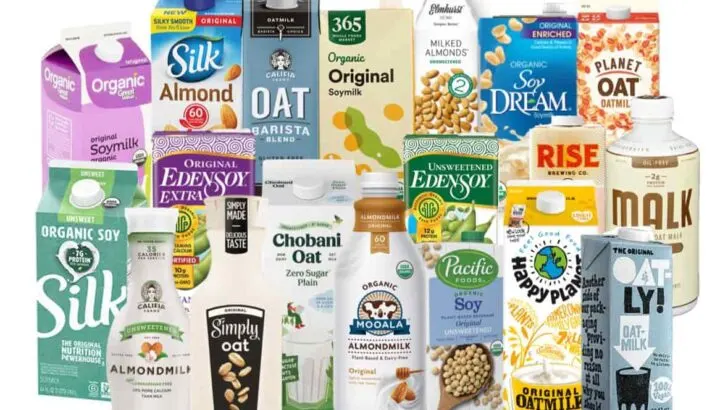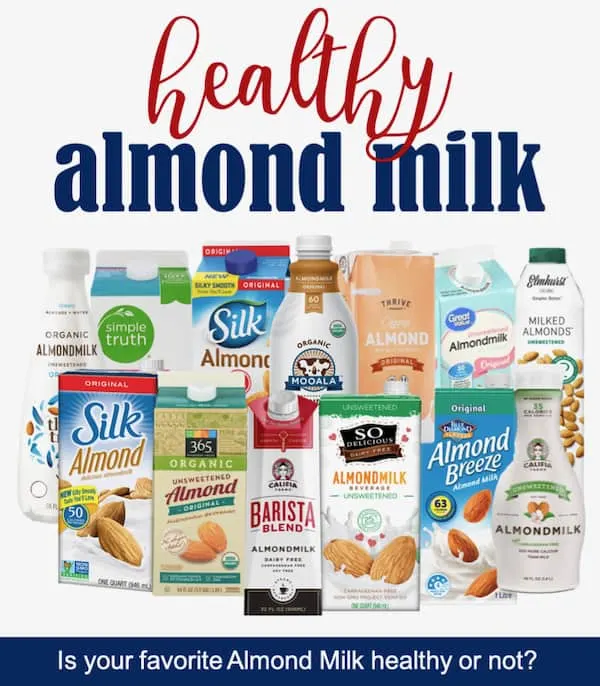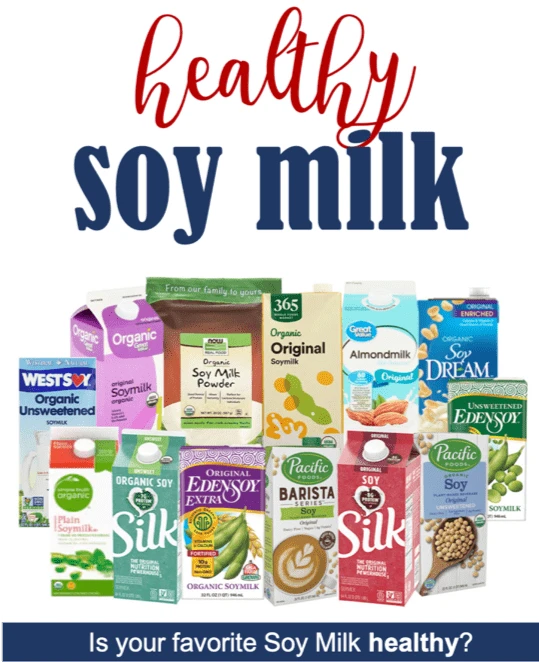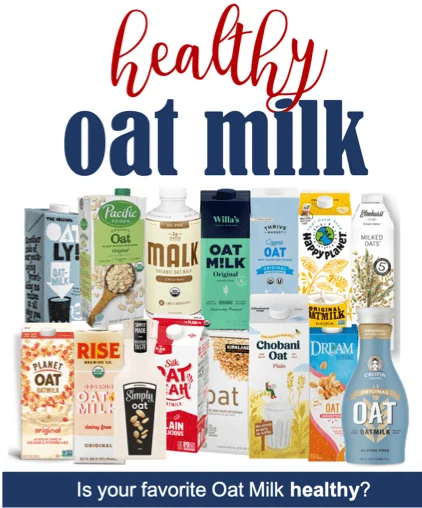Plant-based milk alternatives made from nuts, seeds, and grains are gaining popularity and available almost everywhere these days.
While these options are great for people who follow a dairy-free or plant based diet, it can be hard to decide which non-dairy beverage is the healthiest option.
This comprehensive guide covers what to look for and what to avoid when choosing a healthy plant-based beverage.
Healthy Plant-Based Milks:
- Don’t skimp on the key ingredient
- Have minimal or no added sugar
- Are free of glyphosate residue (organic or certified non-glyphosate)
- Avoid gums, thickeners, and emulsifiers
- Have minimal sodium
Water will always be the first ingredient in a non-dairy milk. Ideally, the only other ingredient in the beverage is the nut, grain, seed, or legume the drink is named for.
Extra ingredients are not necessary. They are added to hide the small amount of the key ingredient and improve texture, shelf-stability, heat-stability, and vitamin content.
What to look for when choosing a healthy dairy-free milk
1. Large amount of key ingredient in beverage
Most store-bought non-dairy beverages contain very little of the “milked” ingredient. The nut, seed, legume, or other key ingredient is the most expensive part of the beverage.
How much of the key ingredient is in your favorite nut milk?
The easiest way to approximate the amount of seeds, nuts, or legumes are in a beverage is by looking at the calories or fat in a beverage.
If an unsweetened nut-based drink has less than 50 calories or 5 grams of fat per one cup serving, you are essentially buying thickened flavored water.
Recommendation: To find a high quality plant-based beverage, look for an unsweetened drink with around 100 calories and 10 grams of fat per one cup serving.
2. Minimal or no added sugar

Many plant-based beverages have high amounts of added sugar. In fact, several brands contain more than a tablespoon of added sugar per one cup serving. That is more than half of the AHA’s recommended daily intake of added sugar for women.
Typical added sugars listed in the ingredients include cane sugar, honey, rice sweetener, evaporated cane syrup, brown rice syrup, and malt extract.
Both rice and oat beverages have a lot of natural sugars that can be considered added sugar depending on how the grain is processed.
Read more on recommended daily intake of added sugar and why you want to minimize added sugar consumption.
Recommendation: It is better to buy unsweetened non-dairy milk. If you prefer sweetened beverages, still buy the unsweetened version and add the specific amount and type of sweetener you want.
3. Healthy Plant-Based Milks Avoid Glyphosate Residue
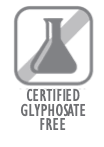
An Environmental Working Group report found high levels of glyphosate residue in popular oat-based cereals. (1)
Farmers spray glyphosate, also known as Roundup, on genetically modified soy crops to prevent weeds and on oat crops to speed up drying at harvest.
The safety of chronic, low-level exposure to glyphosate is unknown. Therefore, it is advisable to avoid conventional oats to minimize glyphosate residue intake.
Recommendation: It is best to buy soy milk and oatmilk certified to be free of glyphosate residue. Organic soy and oat-based milks are a good alternative since organic soy and oats can not be sprayed with glyphosate.
4. Healthy Non-Dairy Milks Avoid Gums and Thickeners

Plant-based beverages often contain gums and thickeners to make the drink’s texture more like dairy milk. These gums and thickeners are also added to make it seem like the beverage has more of the “key” ingredient and also prevent separation.
These gums and thickeners are highly processed and can sometimes cause gastrointestinal discomfort.
Typical gums and other thickeners in diary-free milks include gellan gum, locust bean gum (also called carob bean gum), gum acacia (also called gum arabica), xanthan gum, guar gum, and carrageenan.
Gellan Gum. Gellan gum is a polysaccharide (polymer of sugar) and soluble dietary fiber. This thickener comes from bacteria ferment glucose or other carbon sources such as corn syrup, lactose, whey protein, or soybean extracts. (2, 3, 4)
Locust Bean Gum. Locust Bean Gum a polysaccharide extracted from the seeds of the Carob Tree. Also called carob bean gum, locust Bean Gum is a soluble dietary fiber that can be fermented by intestinal microflora. (3, 5)
Gum Acacia. Also known as gum arabica, gum acacia is a complex mixture of glycoproteins and polysaccharides extracted from the sap of two species of acacia trees. Also called gum arabica, gum acacia is a soluble dietary fiber that is fermented by intestinal microflora. (6)
Xanthan Gum. Similar to gellan gum, xanthan gum is a soluble fiber made when bacteria Xanthomonas campestris ferment sugar. Xanthan gum is fermented by intestinal microflora. (3, 7)
Guar Gum. A polysaccharide extracted from the beans of the guar plant, guar gum is a soluble dietary fiber that is partially fermented by intestinal microflora. (8)
Carrageenan
Carrageenan is a thickener manufactured from red algae seaweed and is widely used in processed foods. (3)
While carrageenan is included on the “generally regarded as safe” food additive list from the FDA, there is growing research linking carrageenan to inflammatory conditions, including inflammatory bowl disease. (9)
In late 2016, the National Organic Standards Board voted to prohibit the use of carrageenan in organic products.(10)
However, in 2018 the USDA decided to not implement the recommendation and carrageenan is still allowed in organic products. (11)
Recommendations for gums and thickeners:
- Avoid any plant-based beverage that contains carrageenan.
- Occasionally eating small amounts of gums and thickeners (other than carrageenan) is probably fine, unless you experience gastrointestinal discomfort or are following a specific diet.
5. Healthy Plant-Based Beverages Have Minimal Sodium
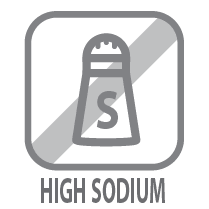
Sodium, from salt and other food additives, is found in almost all processed food. Plant-based milk alternatives are no exception.
Salt is often added to enhance the flavor of non-dairy beverages. Additionally, gums and thickeners added to improve the texture of plant-based milks often contain sodium.
More than 90% of us consume too much sodium each day according to the Dietary Guidelines of America. (12) Read more on the recommended daily intake of sodium and why you want to reduce your daily sodium intake.
Recommendation: If you are on a reduced salt diet, avoid plant-based milks with high levels of sodium.
Types of dairy-free milk alternatives
- Nut-based milks
- Legume-based milks
- Grain-based milks
- Seed-based milks
- Other plant-based milk
Healthy Nut Milks
The most popular nut-based milk is almond milk. However, nut based non-dairy beverages are also made from cashews, pistachios, macadamia nuts, walnuts, and hazelnuts.
When choosing a healthy nut-based milk, look for two ingredients: water and nuts. Elmhurst, Three Trees, and Malk are high-quality, healthy nut-based milks.
Healthy Legume Milks
Soy milk is the most popular legume-base milk. Pea-based non-dairy milks are another legume-based beverage available at most grocery stores.
Unfortunately, almost all pea-protein plant-based beverages contain gums, thickeners, and added sugar. Sproud unsweetened is a healthy pea milk option.
If you are looking for a healthy legume-based milk, your best bet is unsweetened organic soy milk or Sproud Unsweetened plant-based milk. Read our comprehensive evaluation of soy milks.
Healthy Grain Milks
Grain-based milk alternatives include oat milk and rice milk. Oat milk has become an extremely popular non-dairy option in the past couple years.( https://www.nytimes.com/2018/01/19/style/oat-milk-coffee-oatly.html)
However, grain-based beverages tend to be low in protein and have a high glycemic index because they are made from highly processed carbohydrates.
In fact, there are no grain-based beverages that we consider healthy, which is fully explained in our comprehensive evaluation of oat milks.
However, Oat & Seed Oat milk by Three Trees is a healthier oat milk option. Adding seeds to the oatmilk provides protein and fat which helps reduce the impact of the oats on blood sugar.
Healthy Seed Milks
Plant-based beverages are also made with seeds. Seed-based milk options include beverages made from sesame, hemp, chia, pumpkin and flax seeds
Plant-based milks made from seeds are appealing to people because they are grain, nut, and soy free.
However, all of the seed milk options at the grocery store include gums and thickeners, and often the emulsifier lecithin.
Unfortunately, we have yet to identify a healthy seed-only milk option.
Other Healthy Plant-based Milks
Finally, other plant-based milks that don’t fall neatly into the above categories include beverages made from coconut (technically, not a nut!)(ref https://en.wikipedia.org/wiki/Coconut)
With all of these plant-based milk options, you may wonder what is the healthiest dairy-free milk? As with any processed food, it is important to read the ingredients.
Conclusions about choosing healthy non-dairy alternatives
When it comes to finding a healthy soy milk, simple clean ingredients are best. Also, if you like a sweetened soymilk, consider buying the unsweetened version and adding a small amount of your preferred sweetener.
Check out these other product evaluations:
- What vanilla flavored soy milk is healthy?
- Choosing a healthy oat milk
- What popsicles are healthy?
- Choosing a healthy almond milk
- What plant-based burgers are healthy?
- Which popular breakfast cereals are healthy?
- Choosing healthy crackers
Pin article for later:
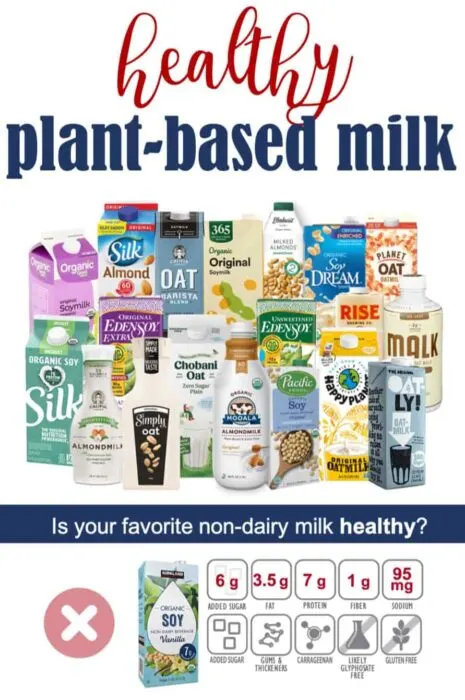
References:
- Breakfast with a dose of Roundup?, EWG Website, 2018 (link)
- Modeling for Gellan Gum Production by Sphingomonas paucimobilis ATCC 31461 in a Simplified Medium, Applied and Environmental Microbiology May 2006, 72 (5) 3367-3374 (link)
- Products, CPKelco Website (link)
- Re-evaluation of Gellan Gum as a Food Additive, EFSA Website, (link)
- Re-evaluation of Locust Bean Gum as a Food Additive, EFSA Website, (link)
- Re‐evaluation of acacia gum (E 414) as a food additive, EFSA Website, (link)
- Re-evaluation of Xanthan Gum as a Food Additive, EFSA Website, (link)
- Re-evaluation of Guar Gum as a Food Additive, EFSA Website, (link)
- The Role of Carrageenan and Carboxymethylcellulose in the Development of Intestinal Inflammation, Frontiers in Pediatrics, 2017, 5: 96 (link)
- “Board Nixes Use of Carrageenan in Organic Food Production”, Food Safety News Website. 2016 (link)
- USDA Defies Advisors, Allows Carrageenan to Keep Organic Label, NPR Website, (link)
- Dietary Guidelines for Americans, 2015-2020, Eighth Ed. (link)
